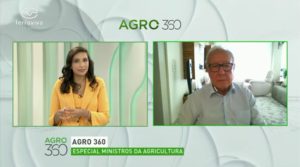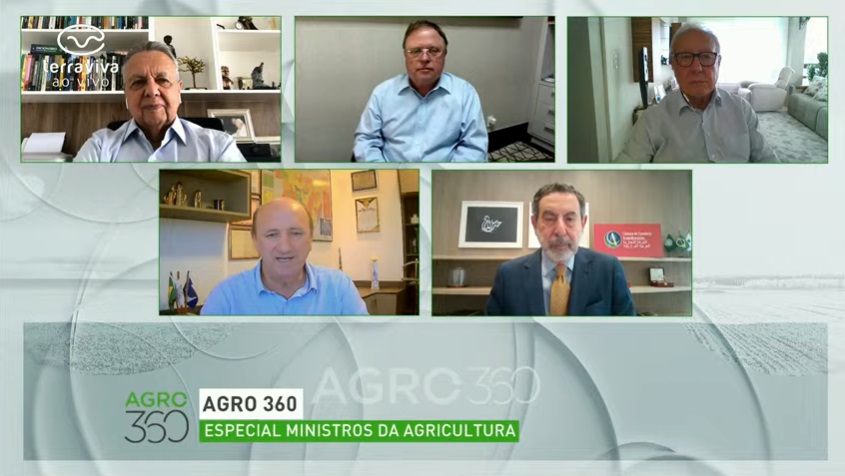São Paulo – Brazil needs to reduce its dependence on foreign wheat and fertilizers, increasing domestic production and diversifying imports. In the television show Agro 360: Special with Ministers of Agriculture, broadcast by Terraviva channel this Tuesday (22), the former ministers of Agriculture of Brazil, Roberto Rodrigues, Francisco Turra, Blairo Maggi, and Neri Geller, and the president of the Arab Brazilian Chamber Commerce (ABCC), Osmar Chohfi, spoke on the scenario of Brazilian agribusiness in the face of the war in Ukraine, possible impacts and perspectives for the year. Former minister Alysson Paolinelli participated with recorded videos.
As a consequence of the possible shortage of wheat, Brazil needs to boost production. This is Francisco Turra’s assessment of the impacts of the war between Russia and Ukraine on Brazilian agribusiness. In addition to being a former minister, Turra is board chair of the Brazilian Association of Animal Protein (ABPA).
According to him, Russia and Ukraine supply around 40% of globally exported wheat, about 40 million tonnes. Of the wheat consumed in Brazil, Turra informed that 70% is used to produce poultry protein. “We have to increase the wheat crop. We increased the harvest in Rio Grande do Sul by 61%, and we will continue, as it is an opportunity and necessity for Brazil to get out of this dependence. Today, the tropical regions produce wheat. We need an initiative to expand the wheat and barley production, and maybe even start exporting,” he said.
Former minister Blairo Maggi, current board chair of the Brazilian Association of Vegetable Oil Industries (ABIOVE), said the main impact of the war on Brazilian agribusiness is the uncertainties, mainly concerning the supply of fertilizers price surges. “Producers have to deal with a very complicated decision because they have to make decisions, so I would say the uncertainty the war brings is huge for the business, and it’s making everyone very worried,” he said.

According to him, Brazil has issues with imports and needs to diversify suppliers of fertilizers. “If Brazil does not produce potassium, it is because it is cheaper to buy from abroad,” he evaluated. For former minister and current federal deputy (PP – Mato Grosso) Neri Geller, Iran can meet the demand for fertilizers Russia may fail to deliver. Turra recalled Jordan also has potassium to sell to Brazil.
Professor and former minister Roberto Rodrigues said the government showed ways to reduce dependence on fertilizers with the National Fertilizer Plan. “We depend 83% on imported fertilizers and 95% on potassium. We may reduce this dependence by half in the next 20 years,” he said.
Turra said it is impossible to submit to the “exorbitant” prices of fertilizers caused by the conflict scenario. “We need 43 million tonnes of fertilizers. Last week, JBS opened a biofertilizer plant in the interior of São Paulo state. Production is still small, but it is a start, and other companies are willing to explore this possibility of investing in fertilizers and biofertilizers. It is necessary to look for alternatives and similar products from other places,” he said.
- Read also: JBS starts fertilizer production in Brazil
Osmar Chohfi spoke about the study by the ABCC presented to the current minister of Agriculture, Livestock, and Food Supply, Tereza Cristina, on fertilizers the Arab countries can sell to Brazil. “Fertilizers are an essential item in the trade basket between Brazil and the Arab world. In 2020, 18% of fertilizers from Arab countries were shipped to Brazil. In this study, we detected some possibilities and, together with the Arab ambassadors, we are identifying potential for increasing exports in nitrogen, phosphates, and potassium. Of course, the ability to increase potassium exports from the Arabs to Brazil cannot replace Russian exports; however, in the general context, it is possible to increase fertilizer exports from the Arab world to Brazil,” he said. The ambassador pointed out the government needs to sign more free trade agreements with the Arab countries to facilitate agribusiness imports and exports.
The TV show, which had the support of the ABCC, was hosted by journalist Renata Maron.
Watch the full show:
Translated by Elúsio Brasileiro




